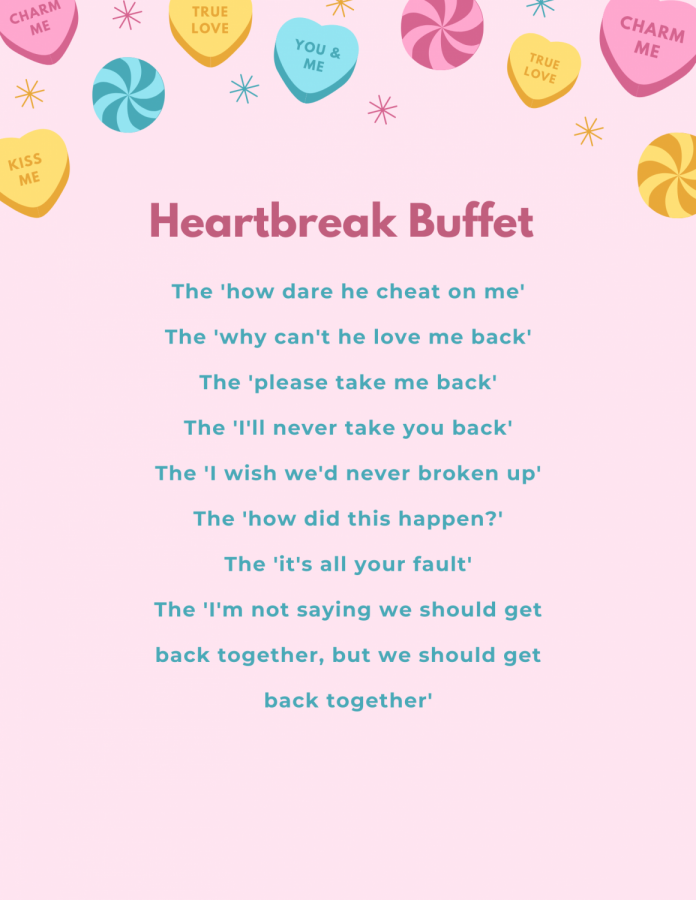Heartbreak buffet. It seems like break up songs have so much variety, there’s one for every nuance of emotion during a break-up. These songs can often end up glorifying love and unhealthy relationships.
Heartbreak: the National Anthem
The music industry is ever-changing. Singers come and go, and popularity is fleeting. The one thing that remains constant is love songs topping the charts. The sheer amount of them is honestly frightening sometimes. How many times can one person possibly get heartbroken? And why are there so many different types of heartbreak? The insane amount of love songs plaguing every music genre contributes to a false idea of love. Although love songs have more representation in the different types of love people may experience compared to movies and books, they still make love seem more epic and all-consuming than it actually is.
Oftentimes, love songs generate the idea that love is everything, and that people’s lives should be centered around it rather than incorporating it as you would a job or a home; all equally important aspects of one’s life. There’s more to life than falling in love, yet love songs make it seem like romance is something we cannot exist without. In reality, that’s extremely toxic. No one should be that dependent on their significant other. It’s just not healthy, mentally or emotionally, for either person. Oftentimes, love songs generate the idea that love is everything, and that people’s lives should be centered around it rather than incorporating it as you would a job or a home; all equally important aspects of one’s life. There’s more to life than falling in love, yet love songs make it seem like romance is something we cannot exist without. In reality, that’s extremely toxic. No one should be that dependent on their significant other. It’s just not healthy, mentally or emotionally, for either person.
Take the song Sucker by the Jonas Brothers, for example. While this song was clearly made not to be taken literally, and the catchy beat and music video contribute to how lighthearted it is, the actual lyrics leave something to be desired. Nick Jonas sings, “I’m a sucker for you/ You say the word and I’ll go anywhere blindly/ I’m a sucker for you, yeah/Any road you take you know that you’ll find me” implying that the guy in the music video would do anything for the girl he’s so in love with, even to the point of following her and memorizing her every quality. However, real love has boundaries, and it has limits. By portraying love in these outlandish scenarios that would just read as creepy in real life, love songs perpetuate the idea that “all is fair in love.” Love songs have a step up to the movie industry solely because they portray real people’s experiences and not corporations’ formulae. Regardless, they can be equally as misleading if read into.
Break-up songs, in my opinion, can be accurate portrayals of love because they look at it in hindsight. They aren’t attempting to inflate love and make it seem more than it is. They aren’t trying to sugarcoat a loving relationship and instead display the reality of emotions that come from it. The entire purpose of break-up songs is for the singer to release their emotions in a constructive way. They’re loud and lyrically brilliant. They don’t attempt to romanticize romance. The dictionary defines romanticize as “describe in an idealized or unrealistic fashion”, and break-up songs can show the less ideal side of love- the side peppered with conflict, unruly emotions, rough edges, but still the same amount of passion.
Of course, when talking about break-up songs, one of the first names that come to mind is Taylor Swift. She hasn’t had a single album without at least one break-up song in it, and they’re all quite different. There’s the angry break-up song, the heart-wrenching break-up song, and the empowering break-up song. Each one stems from a different situation: unfaithful relationships, unrequited love, untimely love, and a plethora of others. Her songs show the range of emotions that love envelops, and she joins one of the many singers we believe can make accurate love songs. So, we compiled a list of what we believe to be other accurate love songs below:
